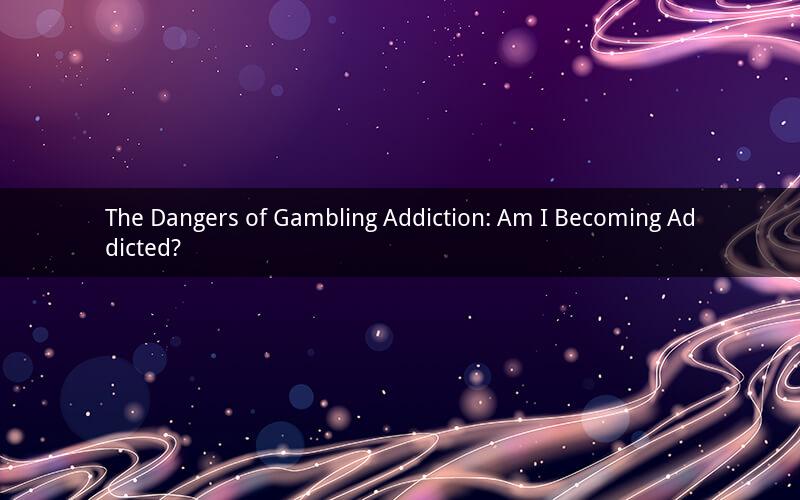
Introduction:
Gambling has long been a popular form of entertainment, but it can quickly turn into a harmful addiction for some individuals. In this article, we will explore the signs and symptoms of gambling addiction and help you determine if you may be at risk.
1. What is gambling addiction?
Gambling addiction, also known as compulsive gambling, is a psychological disorder characterized by an irresistible urge to gamble despite negative consequences. This addiction can affect people of all ages, backgrounds, and income levels.
2. Signs and symptoms of gambling addiction:
a. Preoccupation with gambling: You frequently think about gambling, planning how to win back money, or how to get money to gamble.
b. Loss of control: You are unable to control the amount of money or time spent on gambling.
c. Lying to hide gambling: You may lie to family, friends, or colleagues about how much time and money you spend on gambling.
d. Relationship problems: Your gambling habits may lead to strained relationships with loved ones, as it can interfere with work, family, and social responsibilities.
e. Financial difficulties: You may experience financial problems due to your gambling habits, including debt, bankruptcy, or theft to support your gambling.
f. Physical symptoms: Some individuals may experience physical symptoms, such as insomnia, loss of appetite, or nausea, as a result of their gambling addiction.
3. Risk factors for gambling addiction:
a. Genetic predisposition: Some people may be genetically more susceptible to developing gambling addiction.
b. Personality traits: Individuals who are impulsive, thrill-seeking, or have low self-esteem may be at a higher risk.
c. Environmental factors: Living in an area with easy access to gambling venues or being surrounded by others who gamble can increase the likelihood of developing an addiction.
d. Mental health disorders: Depression, anxiety, or other mental health conditions can contribute to the development of gambling addiction.
4. How to overcome gambling addiction:
a. Seek professional help: Consult with a mental health professional, such as a therapist or counselor, who specializes in addiction treatment.
b. Join a support group: Connect with others who are also struggling with gambling addiction through support groups like Gamblers Anonymous.
c. Create a budget: Set strict limits on your gambling budget and stick to it.
d. Remove triggers: Avoid places or activities that remind you of gambling, such as casinos or sports betting websites.
e. Develop healthy coping strategies: Engage in activities that can replace the urge to gamble, such as exercise, hobbies, or socializing with friends and family.
5. Common myths about gambling addiction:
a. Only poor people become addicted to gambling: Wealthy individuals can also develop gambling addiction.
b. Gamblers always lose money: Some individuals may win money while gambling, but the underlying addiction remains.
c. It's impossible to overcome gambling addiction: With the right support and treatment, many people have successfully overcome their gambling addiction.
d. You can't become addicted to online gambling: Online gambling is just as addictive as traditional gambling, if not more so, due to the ease of access and the anonymity it provides.
e. Addiction is a choice: Gambling addiction is a psychological disorder, not a matter of choice.
Questions and Answers:
1. How can I tell if I'm developing a gambling addiction?
If you find yourself thinking about gambling frequently, losing control over your spending, lying about your gambling activities, or experiencing financial difficulties as a result of gambling, you may be developing a gambling addiction.
2. Can I still enjoy gambling if I'm not addicted?
Yes, you can still enjoy gambling responsibly as long as you are aware of your limits and are not experiencing any negative consequences as a result of your gambling.
3. What if I'm already addicted to gambling? What should I do?
If you suspect you are addicted to gambling, it's important to seek help from a mental health professional. They can provide you with the tools and support needed to overcome your addiction.
4. Are there any medications that can help treat gambling addiction?
While there are no specific medications for treating gambling addiction, some individuals may benefit from medications that help manage underlying mental health disorders, such as depression or anxiety.
5. How long does it take to overcome a gambling addiction?
The time it takes to overcome a gambling addiction can vary widely from person to person. Some individuals may recover within a few months, while others may need ongoing treatment and support for years. The key is to be patient and persistent in your efforts to overcome your addiction.